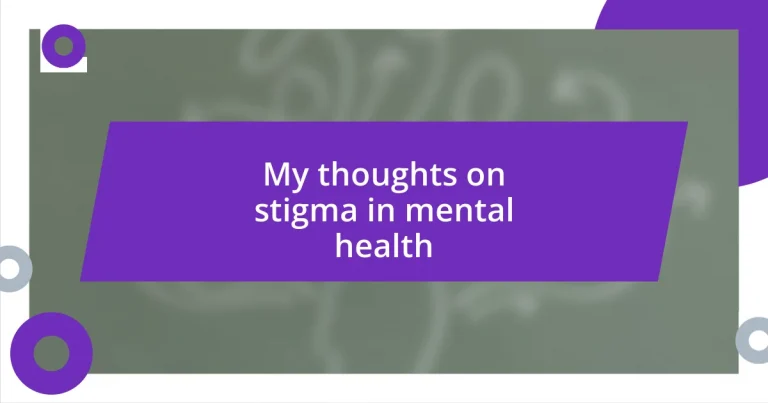Key takeaways:
- Mental health stigma often stems from misconceptions that equate mental illness with weakness, leading to isolation and internalized shame for those affected.
- Open discussions about mental health, fostered by vulnerability and empathy, can break down barriers and create supportive environments for individuals to share their struggles.
- Promoting awareness and initiating regular mental health check-ins can help normalize conversations, reducing stigma and encouraging individuals to seek help without fear of judgment.
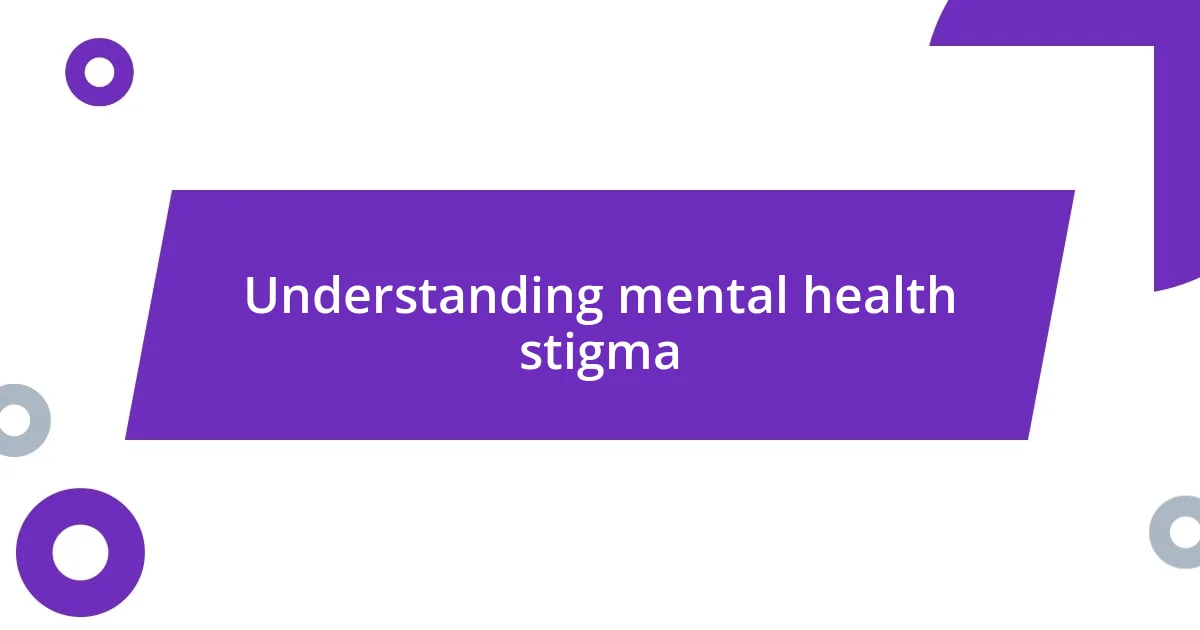
Understanding mental health stigma
Mental health stigma can be insidious, often creeping into conversations in subtle ways. I remember a time when a friend confided in me about their struggles with anxiety, only to quickly brush it off with a joke. Why do we laugh at pain? It struck me how humor is sometimes used as a shield, a way to avoid the discomfort of addressing mental health directly.
Many people harbor misconceptions about mental illness, believing it to be synonymous with weakness or failure. I’ve encountered individuals who avoid talking about their experiences, fearing judgment or misunderstanding. This silence perpetuates the stigma, making it even harder for those in need to seek help. Have you ever felt that pressure? I know I have, and it’s a heavy burden to carry alone.
Recognizing the complexity of mental health stigma is vital for fostering understanding. I’ve witnessed firsthand how openly discussing mental health can transform lives, creating environments where people feel safe to share their experiences. But why is it so hard to have those conversations? It often feels like breaking a taboo, but it’s a crucial step towards acceptance and healing.
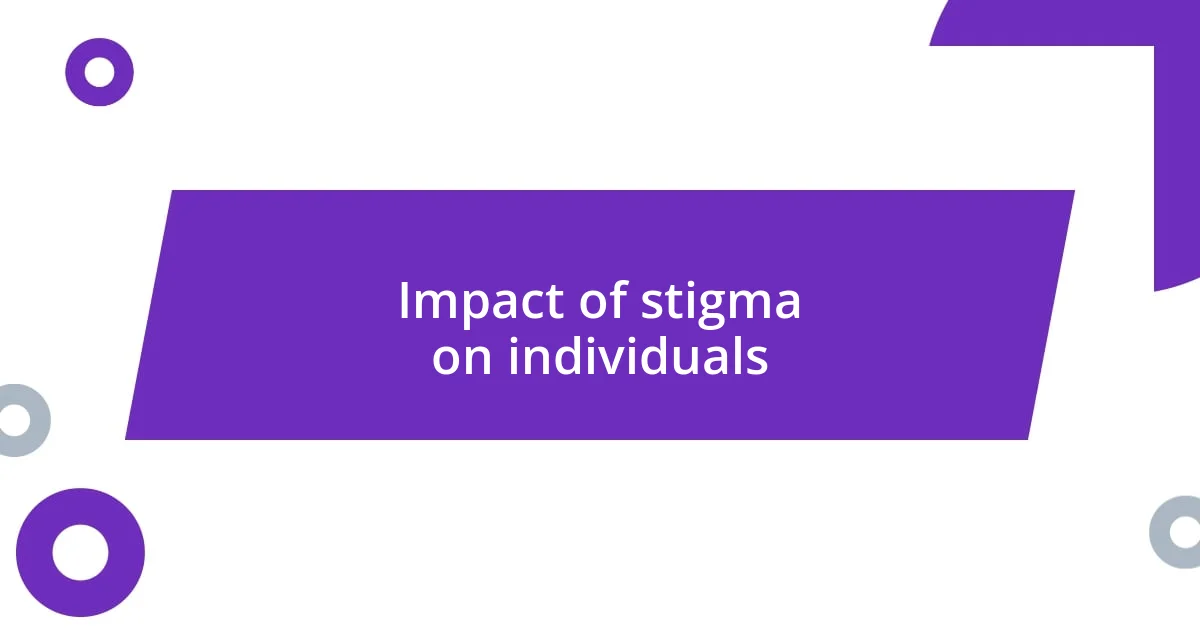
Impact of stigma on individuals
The impact of stigma on individuals facing mental health challenges is profound and multifaceted. I recall meeting a young woman at a support group who shared how her depressive episodes often left her isolated. She mentioned that friends would prioritize her physical health but brush off her emotional struggles with comments like, “Just think positive!” This illustrates how stigma can alienate individuals, making them feel misunderstood and alone in their journey.
Additionally, stigma can lead to internalized shame, affecting one’s self-esteem and willingness to seek help. For instance, I have seen friends avoid discussing their mental health issues for fear of being labeled as “crazy.” This often results not just in a lack of support but also in a detrimental cycle of self-blame. The desire to conform to societal expectations can truly intimidate those battling mental health challenges, reinforcing the stigma that keeps them trapped in silence.
Finally, the repercussions extend beyond the individual; stigma can hinder recovery and access to services. I remember feeling lost when I wanted to find therapy but hesitated because I worried about what others would think. Many individuals face this same barrier, fearing judgment more than seeking the help they desperately need. It’s crucial to recognize that when stigma persists, it not only harms individuals but also perpetuates a culture of silence and fear around mental health.
| Consequences of Stigma | Personal Experience |
|---|---|
| Isolation from social circles | High school friends who stopped inviting me out, thinking I wouldn’t want to join due to my anxiety. |
| Internalized shame | Struggling to admit I needed help despite feeling overwhelmed and trapped in a cycle of negative thoughts. |
| Barriers to accessing help | Realizing I delayed seeking therapy for months due to fear of what others might think. |
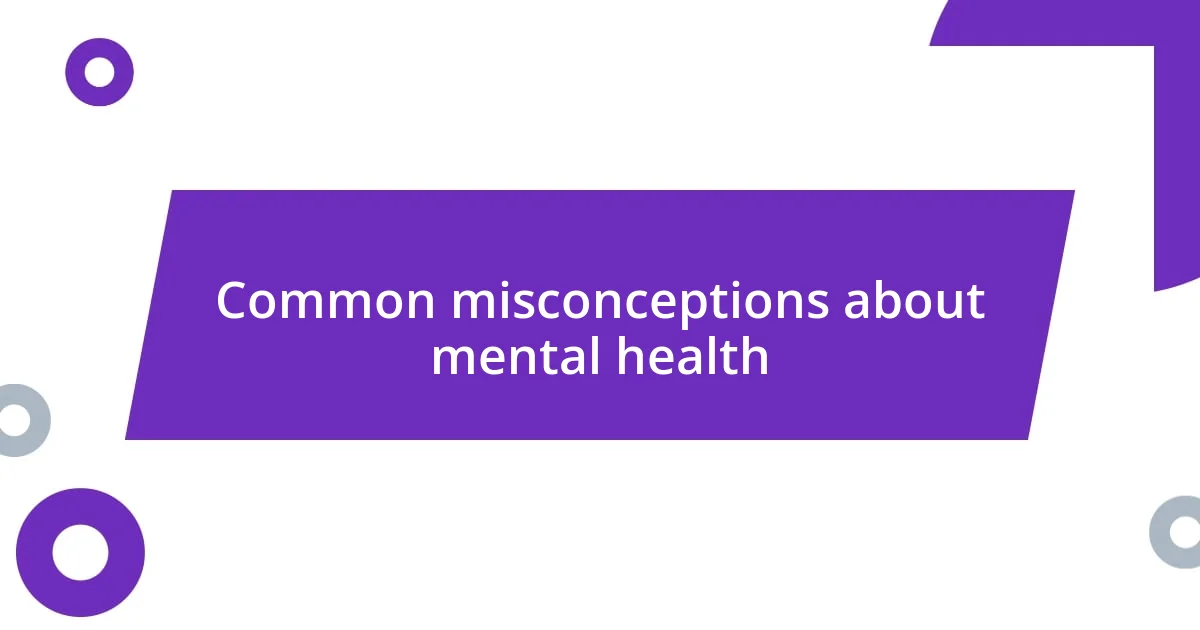
Common misconceptions about mental health
Misconceptions about mental health abound, and they can significantly hinder understanding and compassion. In my experience, I’ve heard statements like “mental illness is just a phase” or “people with mental health issues just need to try harder.” Such beliefs can be incredibly damaging. They create a narrative that invalidates the genuine struggles individuals face daily, making them feel isolated or pressured to hide their true selves.
Here are some common misconceptions that I’ve come across:
- Mental health issues are a sign of personal weakness.
- Talking about mental health is just seeking attention.
- Only certain types of people experience mental illness.
- You can just ‘snap out of it’ if you try hard enough.
It’s heartbreaking to think about how these misunderstandings can prevent someone from reaching out for help. I recall a conversation with a co-worker who mentioned feeling exhausted and depressed but felt compelled to “tough it out” due to societal expectations. This mentality reinforces the idea that vulnerability is a flaw, making it even tougher for people to seek the support they need. Understanding these misconceptions is a critical step forward in combating stigma.
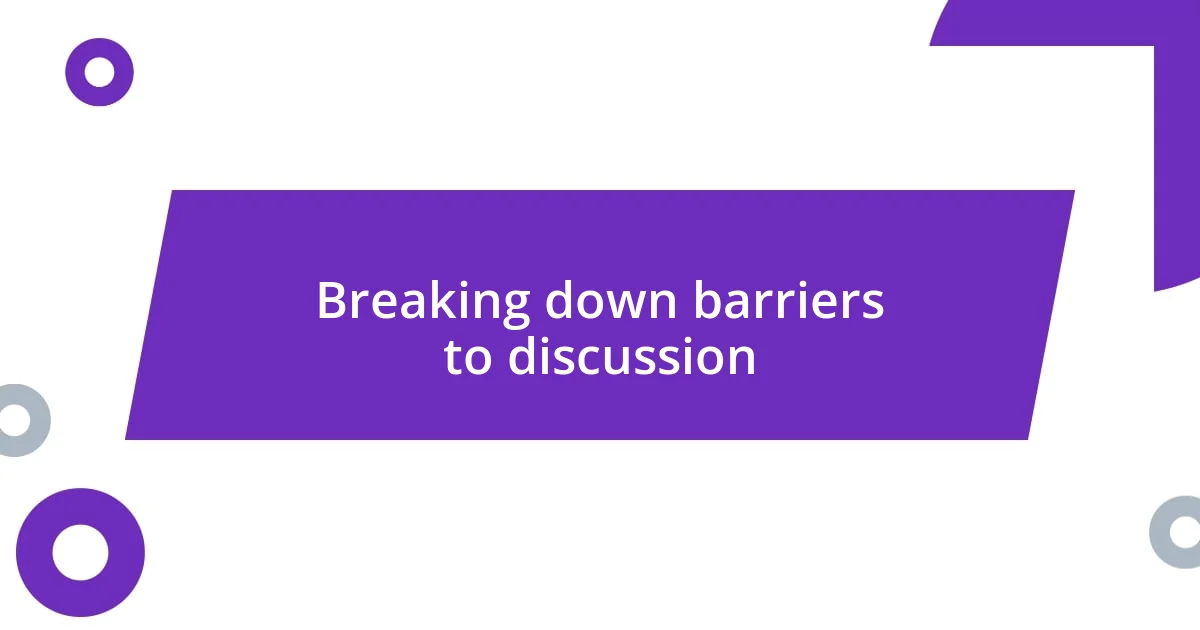
Breaking down barriers to discussion
Breaking down barriers to discussion is essential for fostering a more open dialogue about mental health. I often think about how a simple, well-placed question can break the ice. For instance, when a friend casually asked, “How are you really doing?” it opened up a space where I felt safe to share my struggles. This kind of open inquiry can encourage others to open up too, creating opportunities for genuine connection.
However, I’ve noticed that many people feel awkward or hesitant to discuss mental health. It’s almost as if there’s an invisible wall that makes us shy away from the topic. I remember attending a family gathering where my cousin briefly mentioned feeling anxious at work, only for the conversation to quickly shift to politics. That moment made me realize how easily we can sidestep real feelings, and how important it is to confront these conversational barriers head-on. What if we challenged ourselves to ask follow-up questions instead?
To truly break down these barriers, vulnerability must be met with openness. When I started sharing my own experiences with anxiety, I noticed a shift in my friends; they began to share their stories too. It was eye-opening to see how much we all longed for these kinds of conversations. Creating a safe space to discuss mental health allows everyone to feel heard and validated, turning what was once a taboo into a topic that can be approached with compassion and understanding.
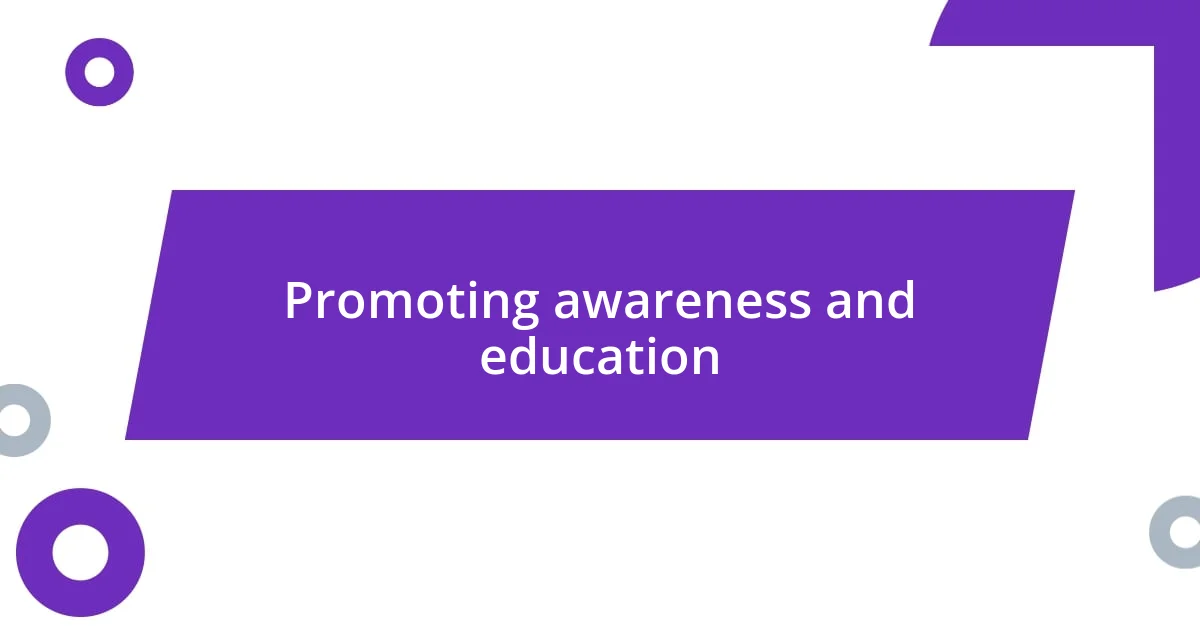
Promoting awareness and education
Promoting awareness and education is vital in shifting the narrative around mental health. I remember the first time I attended a mental health workshop—it was enlightening. The facilitator emphasized how knowledge empowers us to recognize when someone is struggling, and it struck me just how little I had really understood beforehand. Isn’t it fascinating how a bit of information can change our perspective entirely?
Moreover, I often think about the power of sharing stories in educational settings. During a panel discussion at my local community center, a speaker openly shared their journey with bipolar disorder. Hearing their lived experience humanized the statistics and theories I had learned. It made me realize how personal stories could resonate more deeply than any textbook ever could. Don’t you find that hearing someone speak from their heart can genuinely challenge our preconceived notions?
As we promote awareness, we must also encourage conversations in our everyday lives. I’ve started integrating mental health discussions into my casual chats with friends, asking about their well-being in a more profound way. Just a few straightforward questions can spark meaningful dialogue, helping to normalize these discussions. Wouldn’t it be amazing if we could cultivate a culture where mental health is as openly discussed as our weekend plans?
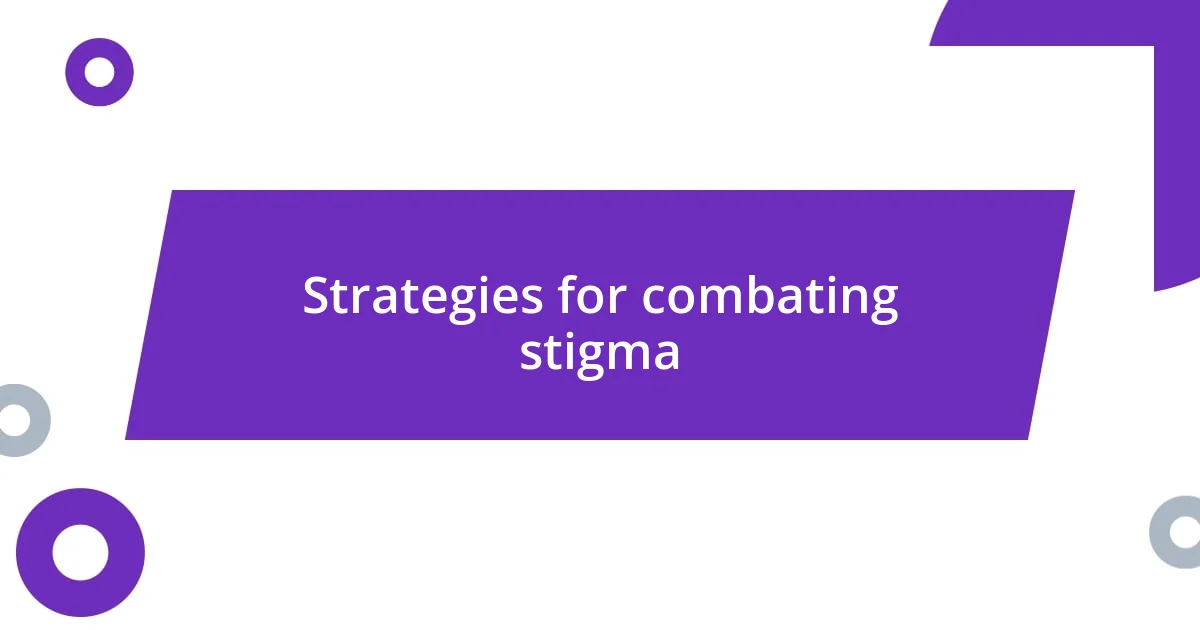
Strategies for combating stigma
Building a supportive community is one of the most effective strategies for combating stigma. I think back to a support group I once attended where camaraderie was palpable. Each person’s story felt like a thread weaving us together, breaking down isolation. Have you ever felt the power of shared experiences? It transforms how we view our struggles and reminds us we’re not alone in this journey.
Another crucial approach is actively promoting mental health advocacy through social media. I remember posting about my own experiences during Mental Health Awareness Month, and the response was overwhelming. Friends and acquaintances began sharing their challenges, and suddenly, it became a collective movement rather than a solitary fight. Isn’t it inspiring how digital platforms can amplify our voices and unite us in the push for understanding and acceptance?
Finally, encouraging empathy and compassion in our interactions can disrupt stigma. I make a conscious effort to approach conversations with curiosity rather than judgment. When a coworker opened up about their battle with depression, I realized how important it was to listen without trying to “fix” anything. How often do we rush to provide solutions rather than simply be present? This small shift in attitude can foster an environment where individuals feel safe to express themselves without fear of being dismissed.
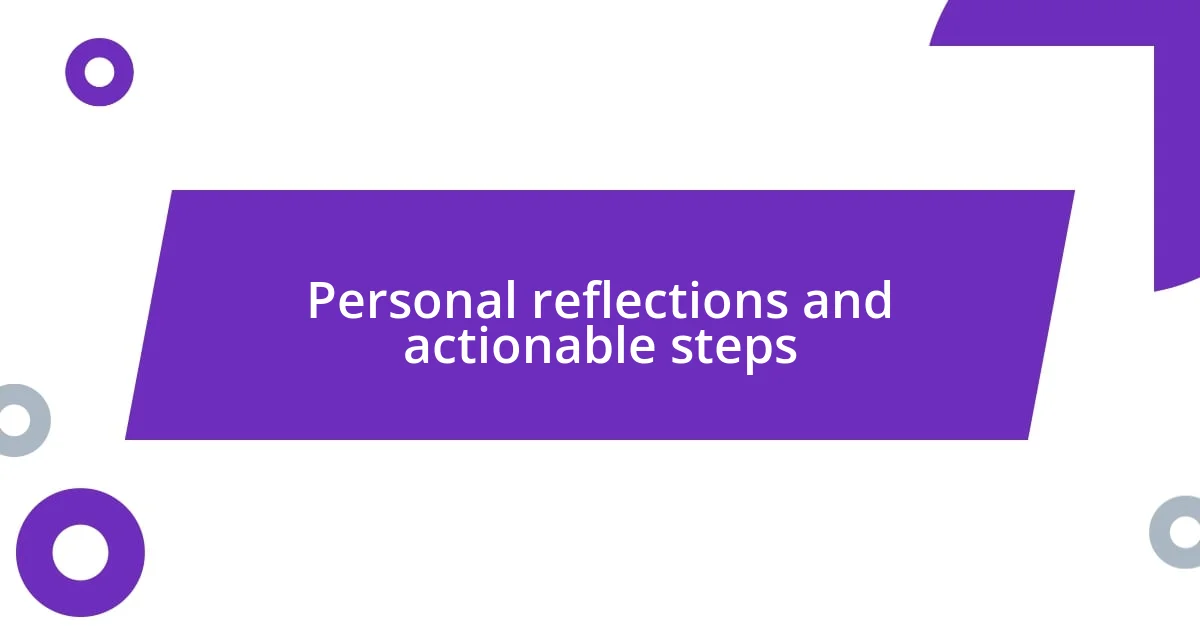
Personal reflections and actionable steps
Reflecting on my own experiences, I can’t help but think about the moments that left a lasting impact on me. For instance, during a university lecture, a professor shared their own struggle with anxiety. It made me realize how relatable vulnerability is; it urged me to speak up about my own mental health challenges. Hasn’t vulnerability in our leaders and peers the power to dismantle walls? It creates an atmosphere where conversations can flourish, paving the way toward understanding.
One actionable step I’ve found incredibly effective is to initiate “mental health check-ins” within my circles. I introduced a simple practice at our weekly family dinners where we each share a highlight and a challenge from the week. That practice has not only deepened our connections but also made it easier to discuss more serious concerns when they arise. What if every family adopted such a routine? It might transform how we perceive our loved ones’ struggles and encourage openness.
Another crucial reflection I have is the role of self-compassion in my journey. I recall a particularly tough period when my inner critic was at its loudest, labeling me as weak for needing support. Learning to treat myself with the same kindness I would offer a friend was revolutionary. Isn’t it essential that we start this practice within ourselves? By cultivating self-compassion, we not only heal ourselves but also model the change we want to see in others, making it easier for those around us to seek help without fear of stigma.












